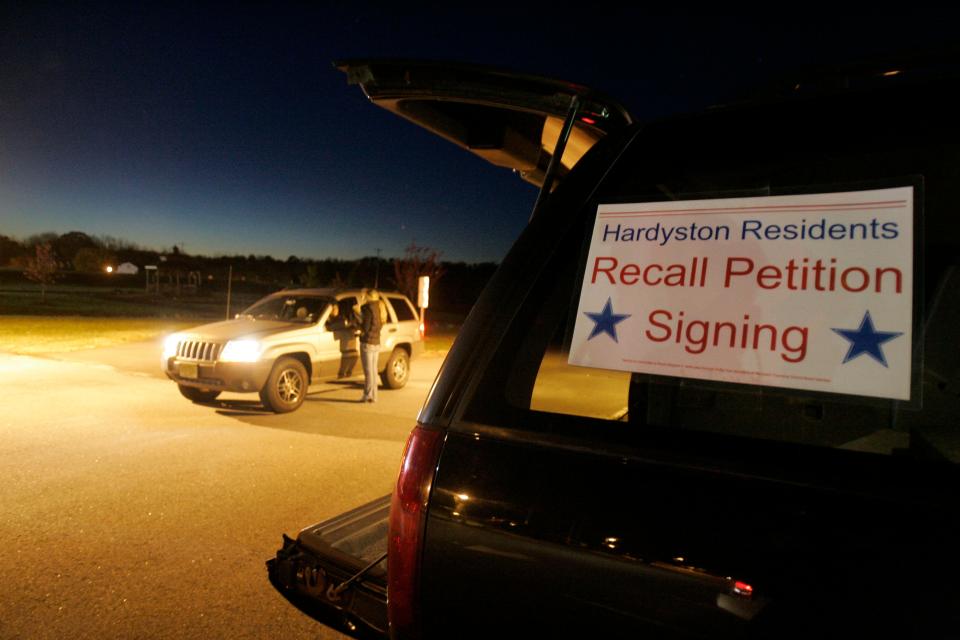Recall elections once spiced up NJ politics. Why are they so rare now?
A new report detailing New Jersey's history of recall elections shows no city has had more instances of voter regret than Hackensack.
Over the state's more than 110-year history of recalls, 30 Hackensack officials have been targeted for removal after taking office, according to a new report from the New Jersey Election Law Enforcement Commission.
Called “Recall Elections in New Jersey — Citizen Safety Valve or Empty Threat?” the report is the 30th white paper released by the commission since 1988. Officials there said it is likely the state's only complete historical record of recall drives and elections.
“While the right to recall public officials before their term expires has existed more than a century in the state, it is perhaps the rarest type of election,” said Joseph Donohue, the commission's deputy director. “Few voters have ever taken part in a recall election in New Jersey. Many voters probably do not even realize they have that right."
NJ's rich election recall history
Since recall elections were established in 1911, only 80 have been held, according to the report. It took 25 years to hold the first 11. There has been only one since 2010. They peaked in the 1980s, when 18 officials were recalled.
Abandoned vehicles: Hackensack has come up with a way to deal with vehicles abandoned on streets
Though the residents of Hackensack have targeted more officials than any other municipality for removal, they have voted in only seven recall elections. Records show 23 of the 30 targeted officials were able to withstand a recall movement, most recently a trio of school board candidates in 2012. Five were recalled.
Bergen County has most recall efforts
Hackensack is not alone in Bergen County when it comes to recalling officials. County residents have collectively targeted a state-leading 105 officials for removal. In addition to Hackensack, Lodi and Ridgefield Park have also had more than 10 recall drives.
Former Lodi Mayor Christopher Paci saw the recall process from both sides.
In 1975, Paci won a mayoral election against recalled incumbent John Bombace while under 24‐hour police protection due to an alleged "contract" put out for his killing, The New York Times reported after Paci's win. Paci would later skirt a 1983 attempt to put him up for recall after the local government laid off 40 employees, including 11 police officers, to eliminate a $200,000 budget deficit, The Record reported that September.
NJ hot dog shops Get ready hot dog lovers! Callahan's is coming back to Bergen County
Lodi later rehired all 11 officers and 25 of the 29 other employees. The other four retired or found work elsewhere, Paci told The Record that November.

The state's first recall vote
The state's first recall election came in 1914, three years after Woodrow Wilson, then the governor and later U.S. president, approved them for municipal commissioners who had served more than a year in office.
The target was Deal Mayor William Levy, who attempted to evade a recall by resigning in November 1913, only to be reappointed the next day. He was nonetheless called to face a challenge the following June.
Levy won by nearly 2-1, and voters rejected a proposal to reduce the recently expanded number of town commissioners from five back to three, The New York Times reported.
That recall election spurred further controversy when Deal's tax collector, E.R. Ruben, was charged with illegal voting. Ruben was a known resident of Belmar, the newspaper reported.
That arrest wasn't the last to stain a recall election.
During a 1934 recall election in Keansburg, a 53-year-old local arrived at the 2nd District polling site drunk and was subsequently arrested for drunken driving. Five more people were arrested post-election after being accused of illegally voting, the Asbury Park Press reported.
At the time, the town's population was an estimated 2,190. Yet there were slightly more than 2,200 registered voters on its books, the newspaper reported.
Before 1995, only residents of Atlantic, Bergen, Essex, Hudson, Mercer and Union counties had the ability to recall. Moreover, state-elected and school board officials were excluded. Since then, only three school board recall elections have been held and just two trustees have been removed from office. State-level politicians have wholly evaded recall elections.
Revisions to the law slow recalls
The 1995 revisions also made municipal recalls increasingly rare by requiring one-quarter of registered voters - rather than voters in the last election - to sign a recall petition. Only one municipal official has been ousted from office via recall since 2010, according to the report.
Though commission officials did not dive into the reasoning behind recall elections, they did nonetheless find some common themes for recall movements. Among them were higher taxes, personnel decisions, budget issues and alleged corruption or malfeasance.
They also found that recalls have historically been less successful in cities, due to the number of petition signers required. Of the nearly 650 officials targeted, fewer than one in six have been recalled.
The most recalled at once was five, and it was in Hackensack. Voters there removed Mayor Edgar Duell and all four members of the Hackensack council after resentment mounted in the wake of a new property tax assessment protocol that raised residential rates and lowered rates for commercial properties.
This article originally appeared on NorthJersey.com: Recall elections once spiced up NJ politics. Why are they so rare now?

